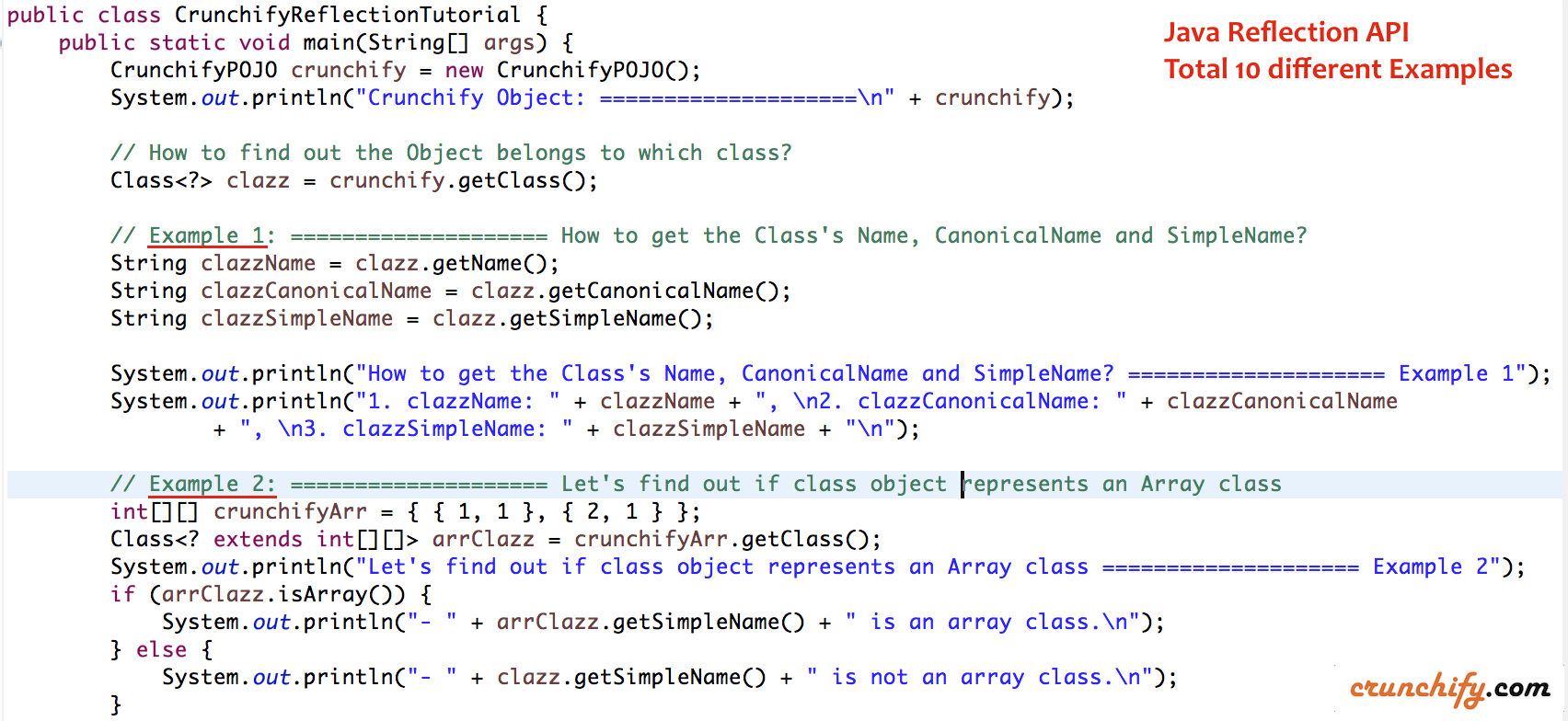
Best programmatically way to get all Declared Class Fields in Java using Reflection APIs
In this tutorial I’m going to 1st write simple Java POJO and will perform all Java Reflection Examples on POJO. You must have heard of Term POJO. What is Plain Old Java Object?
Also if you have below questions then you are at right location:
- java – How to create a POJO?
- java – Create simple POJO classes
- Plain old Java objects (POJOs) in Java
- Introduction to POJO (Plain Old Java Object)
- Designing the POJO class
- Create 1st Java POJO class Person
A POJO is just a plain, old Java Bean with the restrictions removed. Java Beans must meet the following requirements:
- Follow the Bean convention of
getFoo(orisFoofor booleans) andsetFoomethods for a mutable attribute named foo; leave off the setFoo if foo is immutable. - Default
no-argconstructor - Must implement
java.io.Serializable
POJO does not mandate any of these. It’s just what the name says: an object that compiles under JDK can be considered a Plain Old Java Object.
No app server, no base classes, no interfaces required to use.
Let’s create POJO class called CrunchifyPOJO.
package crunchify.com.tutorials;
/**
* @author Crunchify.com Simple POJO Example
*/
public class CrunchifyPOJO {
public String name;
protected String webAddress;
public String email;
protected int zip;
public CrunchifyPOJO() {
name = "Crunchify.com";
webAddress = "https://crunchify.com";
email = "test@crunchify.com";
}
// ==========================================================
// Create a Setters and Getters for all variables
// ==========================================================
public String getName() {
return name;
}
public void setName(String name) {
this.name = name;
}
protected String getWebAddress() {
return webAddress;
}
protected void setWebAddress(String webAddress) {
this.webAddress = webAddress;
}
public String getEmail() {
return email;
}
public void setEmail(String email) {
this.email = email;
}
protected int getZip() {
return zip;
}
protected void setZip(int zip) {
this.zip = zip;
}
public void thisIsCrunchifyReflection() {
System.out.println("- Hey This is Crunchify's Refection API tutorials. More than 400 Tutorials on Crunchify.com");
}
// ==========================================================
// Create a String description of a Crunchify credentials
// ==========================================================
public String toString() {
String result = "Name: " + getName() + "\n";
result += "WebAddress: " + getWebAddress() + "\n";
result += "email: " + getEmail() + "\n";
result += "zip: " + getZip() + "\n";
return result;
}
public static void main(String[] args) {
// Create and print a CrunchifyPOJO object ...
CrunchifyPOJO crunchify = new CrunchifyPOJO();
crunchify.setName("Crunchify.com");
crunchify.setWebAddress("https://crunchify.com");
crunchify.setEmail("test@crunchify.com");
crunchify.setZip(95124);
System.out.println(crunchify);
}
}
Result:
Name: Crunchify.com WebAddress: https://crunchify.com email: test@crunchify.com zip: 95124

Now let’s have Java Reflection's Example based on this POJO.
Take a look at below Example class CrunchifyReflectionTutorial.java which covers total 9 different Java Reflection API’s examples:
Are you running a Java program?
What if you want to inspect classes, interfaces, fields and methods at runtime, without knowing the names of the classes, methods etc. at compile time. Well, with the help of Reflection it’s very easily possible.
Reflection is commonly used by programs which require the ability to examine or modify the runtime behavior of applications running in the Java virtual machine.
Regarding Java Reflection If you have any of below questions then you are at right location:
- Java Reflection Tutorial for Classes, Methods, Fields
- Dynamic Class Loading using Java Reflection API
- Take an in-depth look at the Java Reflection API
- java api reflection – How to create an object using Constructor object
- reflection – How do I invoke a Java method
- How to use Reflection to call Java method at runtime
- java reflection invoke method without arguments
- How to get the Class’s Name, CanonicalName and SimpleName
- Let’s find out if class object represents an Array class
package crunchify.com.tutorials;
import java.lang.reflect.Constructor;
import java.lang.reflect.Field;
import java.lang.reflect.Method;
/**
* @author Crunchify.com
*
*/
public class CrunchifyReflectionTutorial {
public static void main(String[] args) {
CrunchifyPOJO crunchify = new CrunchifyPOJO();
System.out.println("Crunchify Object: ====================\n" + crunchify);
// How to find out the Object belongs to which class?
Class<?> clazz = crunchify.getClass();
// Example 1: ==================== How to get the Class's Name,
// CanonicalName and SimpleName?
String clazzName = clazz.getName();
String clazzCanonicalName = clazz.getCanonicalName();
String clazzSimpleName = clazz.getSimpleName();
System.out.println("How to get the Class's Name, CanonicalName and SimpleName? ==================== Example 1");
System.out.println("1. clazzName: " + clazzName + ", \n2. clazzCanonicalName: " + clazzCanonicalName
+ ", \n3. clazzSimpleName: " + clazzSimpleName + "\n");
// Example 2: ==================== Let's find out if class object
// represents an Array class
int[][] crunchifyArr = { { 1, 1 }, { 2, 1 } };
Class<? extends int[][]> arrClazz = crunchifyArr.getClass();
System.out.println("Let's find out if class object represents an Array class ==================== Example 2");
if (arrClazz.isArray()) {
System.out.println("- " + arrClazz.getSimpleName() + " is an array class.\n");
} else {
System.out.println("- " + clazz.getSimpleName() + " is not an array class.\n");
}
// Example 3: ==================== Let's find out Object's Type
Double crunchifyDouble = 11.1;
System.out.println("Let's find out Object's Type ==================== Example 3");
System.out.println("- 11.1 is of Type: " + crunchifyDouble.getClass().getName() + "\n");
// Example 4: ==================== How to get SuperClass
System.out.println("How to get SuperClass ==================== Example 4");
System.out.println("1. Superclass of crunchify: " + crunchify.getClass().getSuperclass()
+ "\n2. Superclass of crunchifyDouble: " + crunchifyDouble.getClass().getSuperclass() + "\n");
// Example 5: ==================== How to check if class is Primitive
// Type of not?
System.out.println("How to check if class is Primitive Type of not? ==================== Example 5");
System.out.println("1. Is 'int' a Prmitive Type: " + int.class.isPrimitive());
System.out.println("2. Is 'String' a Prmitive Type: " + String.class.isPrimitive());
System.out.println("3. Is 'double' a Prmitive Type: " + double.class.isPrimitive());
// Example 6: ==================== How to create an object using
// Constructor object?
// A constructor reflection to create a string object by calling
// String(String) and String(StringBuilder) constructors.
Class<String> clazzString = String.class;
System.out.println("\nHow to create object using Constructor object? ==================== Example 6");
try {
Constructor<?> constructor = clazzString.getConstructor(new Class[] { String.class });
String object = (String) constructor.newInstance(new Object[] { "Hello World!" });
System.out.println("1. String.class = " + object);
constructor = clazzString.getConstructor(new Class[] { StringBuilder.class });
object = (String) constructor.newInstance(new Object[] { new StringBuilder("Hello Universe!") });
System.out.println("2. StringBuilder.class = " + object);
} catch (Exception e) {
e.printStackTrace();
}
// Example 7: ==================== How to get constructors of a class
// object?
System.out.println("\nHow to get constructors of a class object ==================== Example 7");
try {
Constructor<? extends CrunchifyPOJO> constructor = crunchify.getClass().getConstructor();
System.out.println("- Constructor = " + constructor.getName());
} catch (NoSuchMethodException e) {
e.printStackTrace();
}
// Example 8: ==================== How to get field of a class object
try {
System.out.println("\nHow to get field of a class object ==================== Example 8");
Field[] methods = clazz.getFields();
for (Field temp : methods) {
System.out.println("- " + temp.getName());
}
} catch (Exception e) {
e.printStackTrace();
}
// Example 9: ==================== How to invoke a method using Method
// class?
try {
System.out.println("\nHow to invoke a method using Method class ==================== Example 9");
Class<?> c = Class.forName("crunchify.com.tutorials.CrunchifyPOJO");
Object obj = c.newInstance();
Method method = c.getDeclaredMethod("thisIsCrunchifyReflection");
method.invoke(obj);
} catch (Exception e) {
System.out.println(e);
}
// Example 10: ==================== get all Declared Class Fields
Field[] crunchifyFields = CrunchifyPOJO.class.getDeclaredFields();
System.out.println("\nget all Declared Class Fields ==================== Example 10");
for (Field field : crunchifyFields) {
Class<?> type = field.getType();
System.out.println("field name : " + field.getName() + " , type : " + type);
}
}
}
Result:
Crunchify Object: ==================== Name: Crunchify.com WebAddress: https://crunchify.com email: test@crunchify.com zip: 0 How to get the Class's Name, CanonicalName and SimpleName? ==================== Example 1 1. clazzName: crunchify.com.tutorials.CrunchifyPOJO, 2. clazzCanonicalName: crunchify.com.tutorials.CrunchifyPOJO, 3. clazzSimpleName: CrunchifyPOJO Let's find out if class object represents an Array class ==================== Example 2 - int[][] is an array class. Let's find out Object's Type ==================== Example 3 - 11.1 is of Type: java.lang.Double How to get SuperClass ==================== Example 4 1. Superclass of crunchify: class java.lang.Object 2. Superclass of crunchifyDouble: class java.lang.Number How to check if class is Primitive Type of not? ==================== Example 5 1. Is 'int' a Prmitive Type: true 2. Is 'String' a Prmitive Type: false 3. Is 'double' a Prmitive Type: true How to create object using Constructor object? ==================== Example 6 1. String.class = Hello World! 2. StringBuilder.class = Hello Universe! How to get constructors of a class object ==================== Example 7 - Constructor = crunchify.com.tutorials.CrunchifyPOJO How to get field of a class object ==================== Example 8 - name - email How to invoke a method using Method class ==================== Example 9 - Hey This is Crunchify's Refection API tutorials. More than 400 Tutorials on Crunchify.com get all Declared Class Fields ==================== Example 10 field name : name , type : class java.lang.String field name : webAddress , type : class java.lang.String field name : email , type : class java.lang.String field name : zip , type : int
Complete example is self explainable as I tried my best to put as much as system outs into program itself.
Try it out and do let me know if you have any question. Happy coding.
